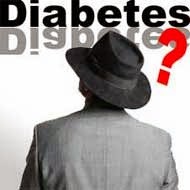Diabetes insipidus is a disease associated with hormone ADH (anti-diuretic hormone) or its receptor. Hormone ADH acts on the kidneys to concentrate urine, resulting in water and electrolyte balance in the body. If there is a disruption in the production of ADH hormone or its receptor in the kidney problem on, it will create excessive urine production that can lead to dehydration and make people feel thirsty all the time.
Diabetes insipidus and diabetes mellitus are two different diseases and not related. Although both diseases have similar symptoms is polyuria (excessive urine production), but in people with diabetes insipidus does not contain glucose.
There are two types of diabetes insipidus:
The diagnosis of diabetes insipidus done with lab tests, including:
Complications that can occur:
therefore, immediately contact your family physician if you have a complaint symptoms as above, or you can try our products HERE which has been successfully tested on patients with diabetes insipidus
More about → What is Diabetes insipidus?
Diabetes insipidus and diabetes mellitus are two different diseases and not related. Although both diseases have similar symptoms is polyuria (excessive urine production), but in people with diabetes insipidus does not contain glucose.
There are two types of diabetes insipidus:
- Central diabetes insipidus. The cause is a shortage of production of the hormone ADH.
- Diabetes insipidus nefrogenis. The cause was kidney insensitive or does not respond to the anti-diuretic hormone. This results in very dilute urine into and out in considerable amounts.
- Excessive thirst
- Excessive urine production
- Fatigue-related disorders electrolyte balance
The diagnosis of diabetes insipidus done with lab tests, including:
- urinalysis
- Plasma ADH levels
- Blood glucose levels, to eliminate the possibility of diabetes mellitus
- Blood electrolyte levels
- urine output
Complications that can occur:
- dehydration
- dry skin
- Weight loss
- fever
- Heart rate increased due to electrolyte imbalance
As with other diseases, we can perform preventive or precautionary effort to avoid the disease diabetes insipidus. A person with a family that has a history of diabetes must take steps to prevent the disease early so that no significant impact on his life. To prevent or lower the risk factors that can be accomplished, among others, is to exercise regularly, avoid stress, apply a healthy diet, maintaining weight, and reduce foods that contain lots of salt. Please also note that the risk factors diabetes insipidus will increase when a person begins to enter the age of 35 years.
Treatment of diabetes insipidus
Diabetes insipidus can be treated by administration of either ADH synthesis is given by injection, tablet, or inhaled. In addition, modifications such as desmopressin acetate antidiurektik hormone can be given as a nasal spray medication to maintain normal urine output. But the use of these drugs should follow the doctor's advice and very careful - careful because if taken too much can cause swelling, fluid retention, and other disruption. Meanwhile antidiurektik hormone injections are usually given to patients who are unconscious.
therefore, immediately contact your family physician if you have a complaint symptoms as above, or you can try our products HERE which has been successfully tested on patients with diabetes insipidus


